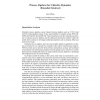Free Online Productivity Tools
i2Speak
i2Symbol
i2OCR
iTex2Img
iWeb2Print
iWeb2Shot
i2Type
iPdf2Split
iPdf2Merge
i2Bopomofo
i2Arabic
i2Style
i2Image
i2PDF
iLatex2Rtf
Sci2ools
134
Voted
MPC
2010
Springer
2010
Springer
Process Algebras for Collective Dynamics
d Abstract) Jane Hillston Laboratory for Foundations of Computer Science, The University of Edinburgh, Scotland Quantitative Analysis Stochastic process algebras extend classical process algebras such as CCS [1] and CSP [2] with quantified notions of time and probability. Examples include PEPA [3], EMPA [4], MoDeST [5] and IMC [6]. These formalisms retain the compositional structure of classical process algebras and the additional information captured within the model allows analysis to investigate additional properties such as dynamic behaviour and resource usage. Stochastic process algebras have been successfully applied to quantitative evaluation of systems for over a decade. For example, in the context of performance analysis, PEPA has been used to describe both software and hardware systems and has helped to incorporate early performance prediction into the design process. Moreover, recently there has been considerable interest in using stochastic process algebras for modelling i...
Classical Process Algebras | Mathematics | MPC 2010 | Process Algebra | Stochastic Process Algebras |
Related Content
| Added | 20 Jul 2010 |
| Updated | 20 Jul 2010 |
| Type | Conference |
| Year | 2010 |
| Where | MPC |
| Authors | Jane Hillston |
Comments (0)

